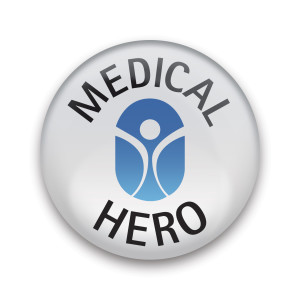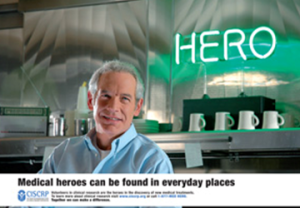Public Service Announcement: Medical Heroes in Everyday Places
This public service announcement was produced with pro bono support from Ogilvy Healthworld in recognition of the volunteers who gave the gift of participation in clinical trials.
Re-Branding Clinical Research to Recognize its ‘Everyday Medical Heroes’

Public education campaigns have proven to be a highly effective strategy for changing public perception. Campaigns like “Got Milk?” and “This is your Brain on Drugs,” affected the views of multiple generations.
Clinical research has long needed its own public service campaign that is recognizable, easy-to-remember, and that can engage the public in thinking differently about clinical research. Medical Heroes is exactly that.
For the general public, clinical research is not typically dinner table conversation. It’s not discussed in high school science classrooms. It’s usually only discussed in a doctor’s office when a patient is diagnosed with an illness. Yet arguably, clinical research touches every person’s life regularly.
According to the US Census Bureau, more than half of all Americans are taking prescription medications at the present time and most Americans report routinely using over-the-counter medications. However, the general public does not connect the medicines and behavioral interventions it consumes to the clinical research and dedication of people before them who made these developments possible.
 Additionally, while an estimated half a billion dollars is spent annually on mass-media patient recruitment advertising and promotion, these messages are met with a large amount of indifference because they have no foundation on which to rest. The public has no context within which to understand the importance of clinical research.
Additionally, while an estimated half a billion dollars is spent annually on mass-media patient recruitment advertising and promotion, these messages are met with a large amount of indifference because they have no foundation on which to rest. The public has no context within which to understand the importance of clinical research.
Extensive media coverage of drug withdrawals and their aftermath; conflicts-of-interest among FDA members and research professionals; questionable pricing practices; and tragic errors resulting in harm to patients, have left the public confused and troubled.
While, recently, perception has improved slightly, the delayed response by the clinical research community has led us to a point of poor public perception and eroding public trust.
Read an article featuring CISCRP in a Wall Street Journal Supplement called Your Guide to Understanding the Need for Clinical Research and Participation, Understanding Clinical Trials: Appreciating Medical Heroes.
